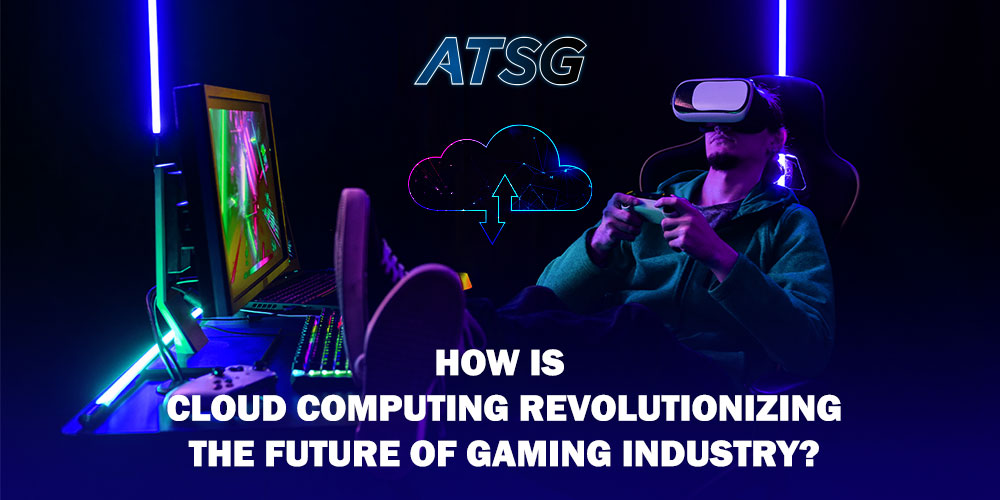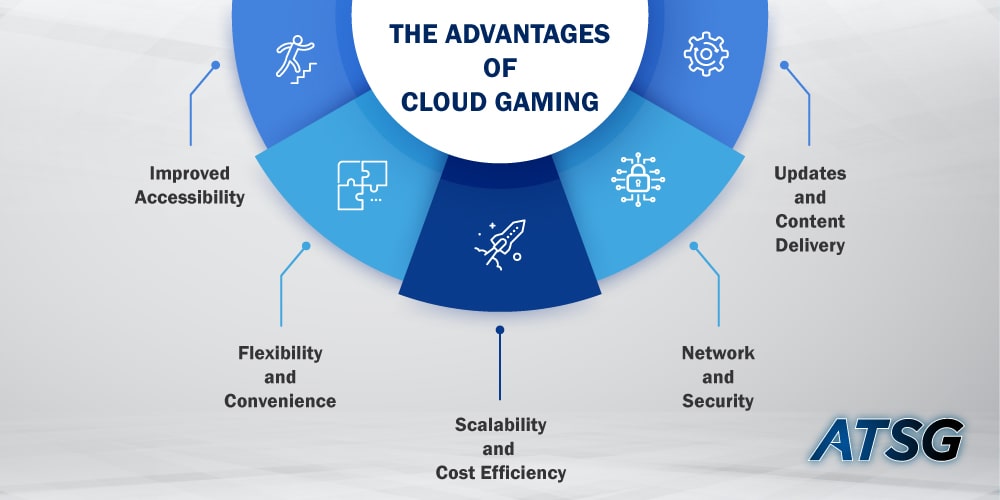The advent of new tools and technologies has shifted gaming towards a whole new route. The global gaming industry has transitioned over the last few years, showing no signs of slowing down. One of the current trends dominating the landscape is cloud gaming, which enables players to enjoy their favorite games without downloading or installing them on their personal machines.
With the rise in adoption of cloud computing and cloud-based transformation, the gaming landscape has changed entirely, from individuals to entire communities of gamers. Naturally, this relies on robust technology and super-fast internet connectivity. Of all the emerging forms of gameplay in the industry, cloud gaming is by far one of the most exciting, and certainly the most consequential.

What is Cloud Gaming?
In an increasingly connected world, Cloud is the term that usually refers to the type of software and services that run by way of servers, that are accessible over the Internet. Cloud Computing is dominating the gaming industry, allowing users to stream high-end games on portable devices, just with fast network connectivity.
Cloud gaming eliminates the need for regular hardware upgrades. These factors are expected to have a positive impact on the growth of this market. Extracting the most out of cloud technologies, the gaming industry will likely fuel the demand and engagement of multiple players for different games.
Cloud gaming is based on the same principle. Games running on powerful remote hardware are streamed to users on high bandwidth connections, so they are playable on devices that wouldn’t necessarily be compatible, or have the processing power to run them locally, such as laptops, smartphones, tablets, and even smart TVs.
With cloud gaming, superb gaming experiences can be delivered to users, without requiring lengthy downloads and expensive hardware. Cloud gaming opens the field for millions of new players, who may not be able to afford expensive consoles and gaming rigs. Now, players can also take their favorite game wherever they go, making it one of the fastest-growing sectors of the video game industry.
The Impact of Cloud Gaming on the Industry
Cloud computing has undoubtedly revolutionized the gaming industry, delivering unprecedented benefits for both gamers, developers and publishers. From enhanced accessibility and convenience, to scalability and sufficiency, the cloud has transformed the gaming landscape altogether.
As cloud gaming services become an increasingly popular phenomenon, we expect to see even more innovation and improvement in the years to come. The never-ending development of cloud technology continues, and so does gaming. The future of gaming will never be the same with upcoming technologies, like Artificial Intelligence (AI) and virtual reality (VR).
The Advantages of Cloud Gaming
The following list explores how cloud computing has been adopted, and put to good use by the gaming industry. We also discuss the numerous advantages it offers.

Improved Accessibility
Cloud computing has broken down the barriers to entry for gamers worldwide. With cloud gaming services, players can stream games directly from cloud servers, without the need for powerful gaming equipment. Everyone is now able to play games online, when and wherever they are, as long as they have access to the Internet, almost regardless of the hardware they have access to.
Flexibility and Convenience
With cloud-based gaming, players are no longer restricted to a single device or console. Gamers can start playing on one device, and seamlessly continue their progress on another, without losing any data or progress. This mobility eliminates the hassle of carrying around consoles or PCs, and allows for un-interrupted gameplay, regardless of the time or location. Additionally, cloud gaming eliminates the need for lengthy downloads, and installations, as games can instantly be accessed and streamed from the cloud.
Scalability and Cost Efficiency
Cloud computing gives developers ample opportunity to create games, as they can scale at large, and be cost-effective at the same time. Game developers can use the power of remote servers to handle complex tasks, like computations or rendering, and have access to virtually unlimited storage. This eliminates the need for expensive on-premise infrastructure, and allows developers to scale resources up or down, based on changing demand. Cloud computing enables gaming companies to reduce upfront costs, only paying for the resources they actually use.
Network and Security
One of the key components in delivering a smooth cloud-based gaming experience is an excellent network, that not only provides low latency, but also ensures security. The resilient privacy of the Cloud helps game publishers in their fight against piracy.
Updates and Content Delivery
Gone are the days of waiting for lengthy game updates or patches. Cloud gaming platforms enable developers to roll out updates and new content seamlessly. Instead of downloading large update files, cloud-based games receive updates on the server side, ensuring players always have access to the latest version. This streamlined update process minimizes downtime, and keeps players engaged with fresh content, enhancing the longevity and popularity of games.
The Importance of Cloud Gaming
Over the last few years, cloud gaming has come a long way, owing to the rapid innovation in Cloud Computing technologies. Both developers and users believe that with cloud gaming, they’ve seen a massive reduction in costs. For developers, the reduction in cost enables them to target multiple markets, and increase their overall performance as well as revenue.
Cloud gaming platforms are gaining rapid acceptance in the market. With the launch of 5G technology in several countries, cloud gaming services are expected to see further rapid growth. Super fast technologies like 5G will play a leading role in delivering highly immersive, lag-free gaming experiences.
5G Technology and Cloud Gaming
The level of transformation in the smartphone industry has changed the way people operate these devices. It no longer works as just a phone, but consists of features that make it just as good as any other high-end hardware. The evolution of smartphones now enables gamers to seamlessly use online game access.
The 5G network is expected to boost Internet speeds to an impressive level of 100 MBPS, and sustain an enormous amount of traffic as well. 5G and Cloud Computing technologies are expected to catalyze the demand for mobile gaming in the upcoming few years.
The Bright Future of Cloud Gaming
The growth in Cloud Gaming that we have seen till date, is just the proverbial “tip of the iceberg”. Leveraging the expertise of leading technology solutions providers, like ATSG, can elevate the global gaming industry to new heights.
ATSG’s Cloud Hosted Virtual Desktops, which can be equipped with state of the art Graphics Processing Units (GPUs), are capable of seamlessly supporting top tier cloud games, delivering a highly immersive and lag-free gaming experience.
Contact ATSG for industry leading Managed IT Services, Intelligent Technology Solutions, best in class Cloud Computing and Cybersecurity solutions.




